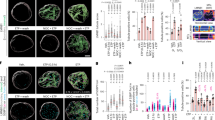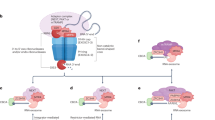Abstract
Mdm2 is a critical negative regulator of the tumor suppressor protein p53. Mdm2 is an E3 ligase whose overexpression leads to functional inactivation of p53. Mdm2 protein stability is regulated by several mechanisms including RING (Really Interesting New Gene) domain-mediated autoubiquitination. Here we report biochemical identification of NEDD4-1 as an E3 ligase for Mdm2 that contributes to the regulation of Mdm2 protein stability in cells. NEDD4-1 was identified from Jurkat cytosolic fractions using an enzyme-dead Mdm2 mutant protein as a substrate for in vitro E3 ligase assays. We show that lysates from Nedd4-1 knockout (KO) mouse embryonic fibroblasts (MEFs) have significantly diminished E3 ligase activity toward Mdm2 compared with lysates from wild-type (WT) MEFs. Recombinant NEDD4-1 promotes Mdm2 ubiquitination in vitro in a concentration- and time-dependent manner. In cells, NEDD4-1 physically interacts with Mdm2 via the RING domain of Mdm2. Overexpression of NEDD4-1, but not an enzyme-dead NEDD4-1CS mutant, increases ubiquitination of Mdm2. NEDD4-1 catalyzes the formation of K63-type polyubiquitin chains on Mdm2 that are distinct from K48-type polyubiquitination chains mediated by the Mdm2/MdmX complex. Importantly, K63-type polyubiquitination by NEDD4-1 competes with K48-type polyubiquitination on Mdm2 in cells. As a result, NEDD4-1-mediated ubiquitination stabilizes Mdm2. NEDD4-1 knockdown reduces the t1/2 (half-life) of endogenous Mdm2 from 20 to 12 min in U2OS cells. Nedd4-1 KO MEFs manifest increased p53 levels and activity, a more robust DNA damage response and increased G1 arrest compared with WT MEFs. Similarly, NEDD4-1 knockdown in WT-p53-bearing cells increases basal p53 levels and activity in an Mdm2-dependent manner, causes stronger p53 responses to DNA damage and results in p53-dependent growth inhibition compared with corresponding NEDD4-1-proficient control cells. This study identifies NEDD4-1 as a novel component of the p53/Mdm2 regulatory feedback loop that controls p53 activity during stress responses.
This is a preview of subscription content, access via your institution
Access options
Subscribe to this journal
Receive 50 print issues and online access
$259.00 per year
only $5.18 per issue
Buy this article
- Purchase on Springer Link
- Instant access to full article PDF
Prices may be subject to local taxes which are calculated during checkout






Similar content being viewed by others
References
Levine AJ, Oren M . The first 30 years of p53: growing ever more complex. Nat Rev Cancer 2009; 9: 749–758.
Wade M, Wang YV, Wahl GM . The p53 orchestra: Mdm2 and Mdmx set the tone. Trends Cell Biol 2010; 20: 299–309.
Yang JY, Zong CS, Xia W, Wei Y, Ali-Seyed M, Li Z et al. MDM2 promotes cell motility and invasiveness by regulating E-cadherin degradation. Mol Cell Biol 2006; 26: 7269–7282.
Khor LY, Bae K, Paulus R, Al-Saleem T, Hammond ME, Grignon DJ et al. MDM2 and Ki-67 predict for distant metastasis and mortality in men treated with radiotherapy and androgen deprivation for prostate cancer: RTOG 92-02. J Clin Oncol 2009; 27: 3177–3184.
Zhou M, Yeager AM, Smith SD, Findley HW . Overexpression of the MDM2 gene by childhood acute lymphoblastic leukemia cells expressing the wild-type p53 gene. Blood 1995; 85: 1608–1614.
Marks DI, Kurz BW, Link MP, Ng E, Shuster JJ, Lauer SJ et al. High incidence of potential p53 inactivation in poor outcome childhood acute lymphoblastic leukemia at diagnosis. Blood 1996; 87: 1155–1161.
Fang S, Jensen JP, Ludwig RL, Vousden KH, Weissman AM . Mdm2 is a RING finger-dependent ubiquitin protein ligase for itself and p53. J Biol Chem 2000; 275: 8945–8951.
Lai Z, Ferry KV, Diamond MA, Wee KE, Kim YB, Ma J et al. Human mdm2 mediates multiple mono-ubiquitination of p53 by a mechanism requiring enzyme isomerization. J Biol Chem 2001; 276: 31357–31367.
Wang X, Wang J, Jiang X . MdmX protein is essential for Mdm2 protein-mediated p53 polyubiquitination. J Biol Chem 286: 23725–23734.
Wang X, Michael D, de Murcia G, Oren M . p53 Activation by nitric oxide involves down-regulation of Mdm2. J Biol Chem 2002; 277: 15697–15702.
Stommel JM, Wahl GM . Accelerated MDM2 auto-degradation induced by DNA-damage kinases is required for p53 activation. EMBO J 2004; 23: 1547–1556.
Itahana K, Mao H, Jin A, Itahana Y, Clegg HV, Lindstrom MS et al. Targeted inactivation of Mdm2 RING finger E3 ubiquitin ligase activity in the mouse reveals mechanistic insights into p53 regulation. Cancer cell 2007; 12: 355–366.
Linares LK, Kiernan R, Triboulet R, Chable-Bessia C, Latreille D, Cuvier O et al. Intrinsic ubiquitination activity of PCAF controls the stability of the oncoprotein Hdm2. Nat Cell Biol 2007; 9: 331–338.
Inuzuka H, Tseng A, Gao D, Zhai B, Zhang Q, Shaik S et al. Phosphorylation by casein kinase I promotes the turnover of the Mdm2 oncoprotein via the SCF(beta-TRCP) ubiquitin ligase. Cancer Cell 2010; 18: 147–159.
Ciechanover A . The ubiquitin-proteasome pathway: on protein death and cell life. EMBO J 1998; 17: 7151–7160.
Chen ZJ, Sun LJ . Nonproteolytic functions of ubiquitin in cell signaling. Mol Cell 2009; 33: 275–286.
Mosesson Y, Chetrit D, Schley L, Berghoff J, Ziv T, Carvalho S et al. Monoubiquitinylation regulates endosomal localization of Lst2, a negative regulator of EGF receptor signaling. Dev Cell 2009; 16: 687–698.
Oren M . Regulation of the p53 tumor suppressor protein. J Biol Chem 1999; 274: 36031–36034.
Wang Z, Inuzuka H, Zhong J, Fukushima H, Wan L, Liu P et al. DNA damage-induced activation of ATM promotes beta-TRCP-mediated Mdm2 ubiquitination and destruction. Oncotarget 2012; 3: 1026–1035.
Wang H, Wang L, Erdjument-Bromage H, Vidal M, Tempst P, Jones RS et al. Role of histone H2A ubiquitination in Polycomb silencing. Nature 2004; 431: 873–878.
Zhong Q, Gao W, Du F, Wang X . Mule/ARF-BP1, a BH3-only E3 ubiquitin ligase, catalyzes the polyubiquitination of Mcl-1 and regulates apoptosis. Cell 2005; 121: 1085–1095.
Wang X, Trotman LC, Koppie T, Alimonti A, Chen Z, Gao Z et al. NEDD4-1 is a proto-oncogenic ubiquitin ligase for PTEN. Cell 2007; 128: 129–139.
Amodio N, Scrima M, Palaia L, Salman AN, Quintiero A, Franco R et al. Oncogenic role of the E3 ubiquitin ligase NEDD4-1, a PTEN negative regulator, in non-small-cell lung carcinomas. Am J Pathol 2010; 177: 2622–2634.
Eide PW, Cekaite L, Danielsen SA, Eilertsen IA, Kjenseth A, Fykerud TA et al. NEDD4 is overexpressed in colorectal cancer and promotes colonic cell growth independently of the PI3K/PTEN/AKT pathway. Cell Signal 2013; 25: 12–18.
Li Q, Lozano G . Molecular pathways: targeting mdm2 and mdm4 in cancer therapy. Clin Cancer Res 2013; 19: 34–41.
Fan CD, Lum MA, Xu C, Black JD, Wang X . Ubiquitin-dependent regulation of phospho-AKT dynamics by the ubiquitin E3 ligase, NEDD4-1, in the insulin-like growth factor-1 response. J Biol Chem 2013; 288: 1674–1684.
Dai B, Pieper RO, Li D, Wei P, Liu M, Woo SY et al. FoxM1B regulates NEDD4-1 expression, leading to cellular transformation and full malignant phenotype in immortalized human astrocytes. Cancer Res 2010; 70: 2951–2961.
Montes de Oca Luna R, Wagner DS, Lozano G . Rescue of early embryonic lethality in mdm2-deficient mice by deletion of p53. Nature 1995; 378: 203–206.
Chou TC . Theoretical basis, experimental design, and computerized simulation of synergism and antagonism in drug combination studies. Pharmacol Rev 2006; 58: 621–681.
Linke K, Mace PD, Smith CA, Vaux DL, Silke J, Day CL . Structure of the MDM2/MDMX RING domain heterodimer reveals dimerization is required for their ubiquitylation in trans. Cell Death Differ 2008; 15: 841–848.
Acknowledgements
This work was supported in part by start-p funds from Roswell Park Cancer Institute (XW). The Roswell Park Core Grant CA16056 is also gratefully acknowledged. We sincerely thank Dr Baoli Yang for providing Nedd4-1−/− and parental MEFs; Dr Yosef Shiloh and Dr Jiandong Chen and Dr Dirk P Bohmann for providing DNA constructs; Dr Moshe Oren for antibodies, Bert Vogelstein for providing HCT116-p53−/−cells and Dr Gigi Lozano for p53/Mdm2 DKO MEFs, respectively. We also thank Dr David Goodrich and other faculty colleagues at the Department of Pharmacology and Therapeutics, Roswell Park Cancer Institute for their critical reading of the manuscript.
Author information
Authors and Affiliations
Corresponding author
Ethics declarations
Competing interests
The authors declare no conflict of interest.
Additional information
Supplementary Information accompanies this paper on the Oncogene website
Supplementary information
Rights and permissions
About this article
Cite this article
Xu, C., Fan, C. & Wang, X. Regulation of Mdm2 protein stability and the p53 response by NEDD4-1 E3 ligase. Oncogene 34, 281–289 (2015). https://doi.org/10.1038/onc.2013.557
Received:
Revised:
Accepted:
Published:
Issue Date:
DOI: https://doi.org/10.1038/onc.2013.557
Keywords
This article is cited by
-
PHB2 promotes SHIP2 ubiquitination via the E3 ligase NEDD4 to regulate AKT signaling in gastric cancer
Journal of Experimental & Clinical Cancer Research (2024)
-
Genome-wide CRISPR screening identifies a role for ARRDC3 in TRP53-mediated responses
Cell Death & Differentiation (2024)
-
The role of NEDD4 related HECT-type E3 ubiquitin ligases in defective autophagy in cancer cells: molecular mechanisms and therapeutic perspectives
Molecular Medicine (2023)
-
The E3 ubiquitin ligase NEDD4 regulates chemoresistance to 5-fluorouracil in colorectal cancer cells by altering JNK signalling
Cell Death & Disease (2023)
-
Thioredoxin-1 regulates self-renewal and differentiation of murine hematopoietic stem cells through p53 tumor suppressor
Experimental Hematology & Oncology (2022)



